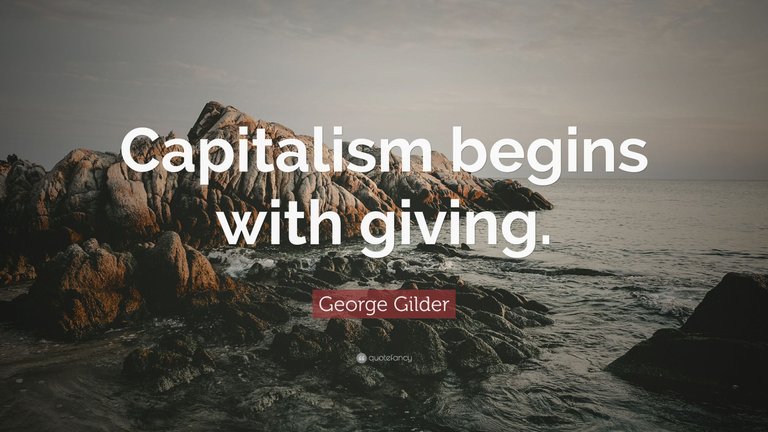
Image Source: https://quotefancy.com/quote/1553848/George-Gilder-Capitalism-begins-with-giving
I’ve spent a lot of time debating whether I agree with Gilder’s idea that capitalism begins with giving. Or, if I do agree, whether that idea still stands today. I believe that it is true that entrepreneurs begin by wanting to help others and giving their time, effort, and risk into their products. However, I don’t think that capitalists continue that idea of giving after their business is in motion. I believe that other people might see “capitalism begins with giving” and think that it means that capitalists will maintain their giving, but Gilder admits that is not true. Giving is the starting point, but their idea of giving can become warped as they achieve more success and profit.
I think that Gilder’s argument is interesting because he admits that some of the ideas that the public has about capitalists are true. He admits that they are often self-interested but to become an entrepreneur you must have a strong connection and involvement with the world around you. He does not try to counter the fact that entrepreneurs are often looking to make a profit, but he does say that the businessmen who hoard or are overly aggressive are the antithesis of capitalism. This reminds me of the discussion last week about robber barons. They were seen as impressive because of their monopolies and extreme wealth, but their strategies were immoral and unfair, which did not make them ideal entrepreneurs or capitalists.
Alignment of Incentives
One of the points about foundational principles that stood out to me was that Gilder believed that when the government tries to deflate capitalist energy, not only incentives are destroyed, but also knowledge. To me, this is the definition of the misalignment of incentives. Policies that put excessive restrictions on entrepreneurs fail to improve societal well-being. By taking from the givers, you restrict them from continuing to give, which affects consumers. Gilder also points out that the knowledge that comes from entrepreneurship cannot be replicated by the government. Entrepreneurship requires passion, determination, and taking risks, and the government cannot exhibit these factors like an entrepreneur could. The government can create incentives, but they don’t have the same goals as a market entrepreneur.
Free Exchange
Gilder puts a lot of emphasis on free exchange, as it is one of the major principles of capitalism. He explains that capitalism began with trade instead of currency. People trade in order to end up better off than they were before. However, there is a difference between trading and giving. Entrepreneurs give in order to establish a business with which they can trade their product for money with consumers. Trading should be beneficial for both parties involved and should be a voluntary exchange of wealth. I did think it was interesting that Gilder mentioned that excessive gifts or welfare are damaging because the recipients are turned into addictive dependents. This is exactly what we talked about after watching Poverty Inc. It is a little discouraging to see that this is something that we still do, even though this book was written in 1981.
How Much Giving?
I think it’s difficult to determine how much credit we should give to capitalists for giving. I completely agree that they give money, time, effort, and risk into their businesses or products, but ultimately, they start their business out of self-interest. Gilder knows that they often work out of self-interest, but I question how much we should be praising entrepreneurs for this giving. Everybody has to give something up when they want something else. I give my time and energy to my job in order to gain money to pay for products, so I am also a giver. I think that everyone is a giver in their own way in a market, so I don’t know how impressed I should be that entrepreneurs have to give in order to sell their products. That may not be a point that Gilder was trying to make, but it seemed to me like there was a larger amount of praise than I expected.
Risk
I think that Gilder was correct that capitalism begins with giving, and entrepreneurs do put a lot of time, money, effort, and risk into their ventures. Overall, I think that the factor that entrepreneurs give the most is risk. This is the factor that they have the least control over. By accepting this risk, they can either have great success or go bankrupt. The willingness to risk their wealth or future is an element of entrepreneurs that is relatively unique. I think that the phrase “Capitalism begins with giving” sounds controversial immediately until you think about all of the risks that entrepreneurs put out into the world without knowing if they’ll receive a return. Giving does not always have to mean donations or free gifts, it can also mean that an entrepreneur is giving the market a new and unique product or that they’ve given years of work and time to the public in order to produce a product that people need. Giving comes in many different forms, and I do believe that entrepreneurs or capitalists do give a lot in order to receive later down the road.